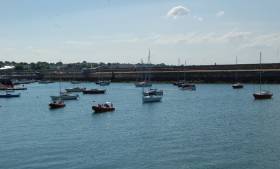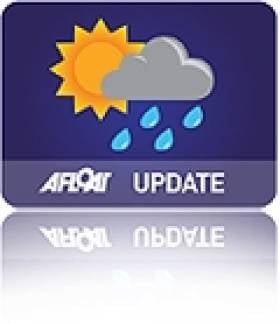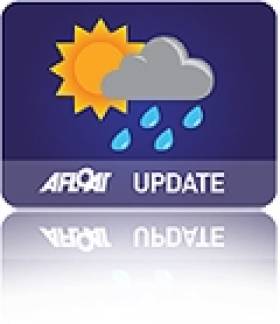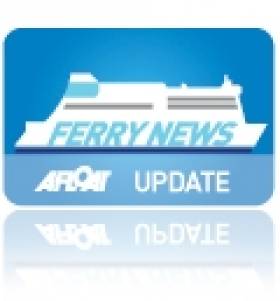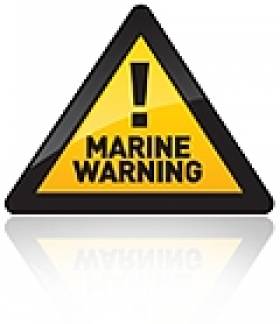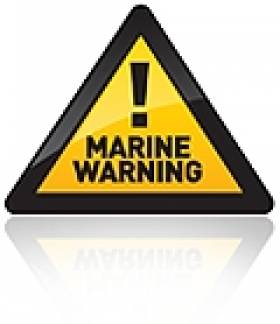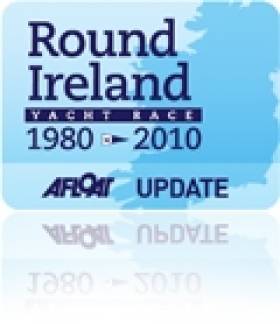Displaying items by tag: weather forecast
Are Sea Area Forecasts Necessary?
In this digital age, with so many available resources providing sea area weather forecasts, is there still a need for national radio to broadcast these forecasts?
I heard an RTE Radio Presenter asking a Met Eireann meteorologist on-air whether there was any point in broadcasting weather forecasts for the marine sector any more, because there was so much detailed weather information available online.
It reminded me of the battles I had with RTE Radio managers and schedulers when they came up with their idea of ending such weather forecasts altogether, because they took up broadcast time which could better used.
I was Marine Correspondent with RTE then so the conversation a few weeks ago between the RTE Presenter and Met Eireann reawakened my memories of those internal RTE disagreements and underlined for me how badly served the maritime sector is by the national media, both broadcast and print.
It also underlines why the BBC Radio Shipping Forecasts are popular amongst Irish fishermen, mariners, professional, commercial and leisure – because it’s a specialised service to the marine sector that RTE doesn’t provide in the same way.
The coastal radio stations of the Coast Guard give weather forecasts which are available at sea, thankfully, but the mindset of the RTE Presenter showed it was closed to around Dublin and Montrose and unaware of the reality of life, particularly in the maritime sector and the coastal communities, outside of urbanisation.
The Met Eireann Meteorologist told the RTE Presenter that there are coastal areas around the Irish shorelines and at sea where there is no internet access and not even a reliable mobile phone signal and that there is still dependence on the State broadcaster for the forecast.
That is a viewpoint I agree with, but one could add that the ‘independent broadcasters,’ those who are also described as national ‘commercial stations’ should also consider.
There has been a demand from the non-State public service broadcaster for a share of the licence fee, but that should also bring responsibilities, such as a sea area forecast for mariners.
Listen to the Podcast below:
Skibbereen Regatta Faces Major Challenge
#Rowing: The huge Skibbereen Regatta, the first Grand League event of the year, is under threat from the weather. The regatta is scheduled for Saturday and Sunday, April 9th and 10th, at the National Rowing Centre in Cork, but there have been strong winds in the area. The organisers say they may choose to limit the regatta to a single day on Saturday. A decision will be made public on Thursday.
Marine forecasts now available on Met Office mobile website
#metoffice – UK Marine forecasts are now available for the first time on the Met Office's recently updated and improved mobile website.
Featuring marine observations, shipping forecasts and high seas forecasts, as well as storm and gale warnings, the new Met Office mobile website has the core information needed for mariners all over the UK.
The mobile website is a graphics-light version of the main Met Office web site and includes the following content:
• Marine forecasts and observations
• NSWWS warnings
• UK 5-day forecasts
• UK observations
• Latest Met Office news
• Latest video forecast
• 'Report severe weather' – a link to the mobile WOW site for people to input weather impact information
• Links with social media
Derek Ryall, Head of the Public Weather Service says, "Accurate, consistent and localised forecasts available from all devices – these were the priorities highlighted by mariners. As a result of the feedback we have taken steps to make accessing warnings and forecasts from the Met Office easier than ever before.
"With the new range of improvements to our mobile app, mobile website and main website during the year, mariners will be able to access up to the minute information that will help to keep them safe and prepared whether on or off-shore."
The Met Office is the UK's National Weather Service, providing 24x7 world-renowned scientific excellence in weather, climate and environmental forecasts and severe weather warnings for the protection of life and property. www.metoffice.gov.uk
Irish Weather Symposium for NUI Galway
#nuigalway – A recently-published report by the UN's Intergovernmental Panel on Climate Change (IPCC) makes dire predictions about the adverse effects and impacts of climate change. The Irish Met Society and NUI Galway have joined up to organise a Symposium on ongoing work in Ireland in researching and monitoring of our atmosphere. The Symposium, which will take place in the Martin Ryan Annex Lecture Theatre in NUI Galway, includes presentations on atmospheric monitoring and research activities of national bodies such as the Environmental Protection Agency, Met Éireann and the Marine Institute. It will be held on Saturday next, 5 April from 10.45am and will be followed on Sunday by a trip to the NUI Galway Atmospheric Research Station at Mace Head in Connemara. All details are available on the Irish Met Society website at www.irishmetsociety.org.
The Symposium should be especially relevant to bodies such as local authorities, farming and other organisations where the weather can have an impact on their work. The aim of the Symposium is to encourage more synergy between the various agencies that are active in atmospheric monitoring and to promote greater use of the data collected. It will provide an opportunity for members of the public and individuals directly involved in Atmospheric Research and Monitoring to inform themselves on current activities in those areas.
A highlight of the day features Dinah Molloy, a researcher with the Scott Polar Research Institute in Cambridge. She uses the weather records kept by captains of whaling ships in the 1700s and 1800s to describe the climate at that time. This is of interest in the light of this week's IPCC report, which refers to how recent weather events such as melting ice caps, more intense rains, more frequent storms and heat waves were brought about by climate change.
A presentation on the work of the European Centre for Medium Range Weather Forecasts (ECMWF) in monitoring air pollutants and their effect on the weather brings an international flavour to the event. Other presentations highlight the work of scientists in NUI Galway at an international level, through their work at Mace Head since 1958. This work is led by Professor Colin O'Dowd, a recent recipient of the Royal Irish Academy Gold Medal for outstanding contribution to the Environment and Geosciences. Aspects of their work will include research on the impact of aerosol particles on the sunlight reaching the earth.
Other organisations that will be describing their work are Met Éireann, the Radiological Protection Institute of Ireland, the Marine Institute and the Environmental Protection Agency. The monitoring of radiation levels in the atmosphere, in particular in an emergency situation, is the focus of one presentation. Other presentations describe how data on the atmosphere are gathered at sea using buoys and on land through a network of observing stations. Improving the accuracy of air quality forecasting is addressed in a presentation by the Environmental Protection Agency.
For background and further information contact Paul Halton, President of the Irish Met Society at [email protected]
Bad Weather Disrupts Ferry Sailings
#FerrySailings - The recent bad weather across the Irish Sea and beyond has led to cancellations on some ferry services. For the latest ferry sailing information for today Thursday 18 April, consult the list of operators below.
IRISH FERRIES
* Due to adverse weather forecasts for the Irish Sea, the following Jonathan Swift Fast Craft ferry sailings for Thursday 18th April have either been cancelled or are in doubt:
Dublin - Holyhead 0845hrs and 1430hrs
Holyhead - Dublin 1150hrs and 1715hrs
All passengers can be accommodated on the Ulysses cruise ferry.
* All other Irish Ferries sailings are expected to sail to schedule.
* For further information please contact Irish Ferries on 0818300400 or 016075519.
STENA LINE
* All Stena Line sailings are expected to depart on time.
* For more information on Stena Line sailings call 003531 204 77 99 when travelling to Britain or 0044 (0) 8705 755 755 when travelling to Ireland or Scotland.
CELTIC LINK FERRIES
For information contact Celtic Link ferries on the following 00353 (53) 9162688
P&O FERRIES
* From Sunday 14th April, additional motorist sailings will operate on the Dublin – Liverpool route at 0900hrs ex Dublin and 0930hrs ex Liverpool.
* There are a number of amendments on the Dublin – Liverpool route during until late May.
* During this period, motorist sailings on the route will operate as follows :-
Ex Dublin 2130 hrs 7 nights a week.
Ex Dublin 0915 hrs Tues – Sat.
Ex Liverpool 2100 hrs 7 nights a week.
Ex Liverpool 0930 hrs Tues – Sat.
The 1500 ex Dublin (Mon – Fri), 1600 Sun and
0300 ex Liverpool (Mon – Sat) will operate at this time as FREIGHT ONLY sailings.
For further info Tel (01) 4073434 or www.poferries.com
For further updates click the AA's Roadwatch Ferry Information link by clicking HERE
Met Eireann Issue Weather Warning
#weatherwarning – Met Eireann has issued a small craft warning tonight with a forecast combination of high winds, heavy rainfall, abnormally low pressure and high tides will cause dangerous conditions in south Munster and east Leinster during Wednesday 15th August.
Gale to strong gale force easterly winds, later veering southeasterly to southerly, will occur. Frequent spells of rain will result in accumulations of 30 to 50 mm generally, with higher totals possible in mountainous areas. The will be a high risk of coastal and river flooding. More here.
Full Moon Prompts Weekend Safety Warning
Spring Tides and an uncertain weather forecast can make this weekend more hazardous than usual.
Irish Water Safety is reminding boaters, sailors, surfers, divers and anglers that there is a full moon on Saturday so they need to be aware of spring tides for the weekend coupled with an uncertain weather forecast.
It is important to take a good weather forecast and to factor this in to their plans accordingly. In addition we wish to remind you of the shorter daylight hours and not to be too ambitious when passage planning over the weekend.
On average 153 people drown in Ireland each year so it is essential to wear suitable protective clothing and a properly serviced and fitted lifejacket when on the water and avoid taking unnecessary risks, especially taking alcohol or drugs as approximately 30% of all drowning victims will have consumed alcohol.
Anglers will be at risk and non nationals in particular should be extremely vigilant as the Atlantic swell is dramatically different to that experienced on the relatively calmer Baltic Sea to which many are accustomed.
It is essential that parents or responsible adults supervise their children at all time when near water.
Walkers should remain alert and stay well away from the edge of ordinarily familiar waterside pathways due to the risk of stranding as a result of the high tides.
Remember your lifeline in an emergency is 999 and 112 therefore carry a mobile phone and ask for the Marine Rescue.
If you discover missing or found Ringbuoys then log on to www.ringbuoys.ie to report them, remember, "a stolen ringbuoy is a stolen life"
Stronger winds will bring the Round Ireland 2010 fleet home earlier than expected and it will be a fascinating, tactical race, says Wind guru Mike Broughton. The Irish Commodore's Cup team weather specialist says the 37 competitors in today's Round Ireland race will get a close hauled course along the south coast to the Fastnet tomorrow. After light northerly winds for the start at 12 noon today the fleet can expect winds to go southwest by 8pm. Mike's podcast prediction is below. Listen in!
More on the Round Ireland Yacht Race:
Round Ireland Yacht Race 2010 Review
Round Ireland Yacht Race, Ireland's top offshore fixture
A Round up of 80 stories on the 2010 Round Ireland Yacht Race


























